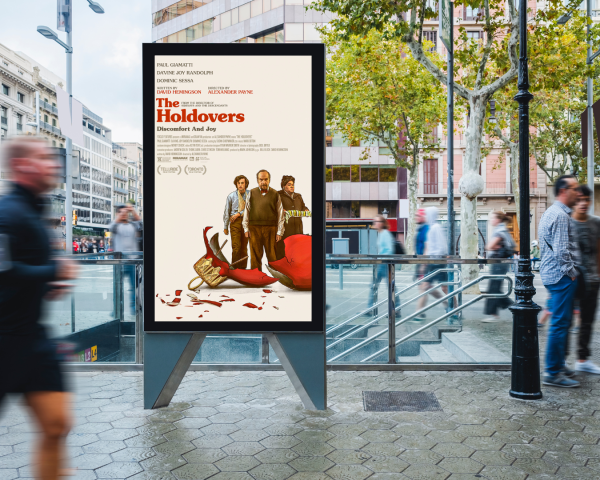
Throughout his career, director Alexander Payne has examined broken and morally reprehensible people with a thick coat of dry-wit humor. Whether that’s in “Election” (1999), “Sideways” (2004) or “Nebraska” (2013), his emasculating portrayals always entice me with their sincerity; yet, for one reason or another, they never fully win me over. Payne’s latest effort, “The Holdovers,” is no exception to this. And even if it’s not a perfect film, it might be the best we’ve seen from the 62-year-old director.
Set in a 1970s boarding school in New England, the film follows Paul Hunham, a notoriously disliked teacher played by Paul Giamatti, who has to look after five “holdover” students during the holidays. However, after a series of events, Paul finds himself unexpectedly responsible for looking over one student for the rest of winter break, Angus Tully, played by first-time actor Dominic Sessa, with the help of Mary Lamb, who is played by Da’Vine Joy Randolph.
At first, Paul operates with ruthless hostility, assigning daily academic exercises and punishments while those who aren’t held over for winter break enjoy their time off from school. In the words of a snarky Angus, “He knows how to inflict maximum pain on us.” But, as the film progresses, Paul slowly eases up on his merciless teaching style, revealing surprising details about his character along the way. Perhaps, when push comes to shove, Paul isn’t the stone-hearted teacher everyone seems to think he is.
As the narrative crystallizes, “The Holdovers” becomes a tale of loss, grappling with the psychological implications of a broken family, grief over a deceased loved one and the sadistic misery of unfulfilled potential. It’s infused with a thick layer of bitterness and sorrow. In most cases, that despondent atmosphere would be almost unbearable for anyone to sit through — especially considering the frequently witty tone. However, the powerhouse performances of the three lead actors keep things bearable and even transcend the stereotypes of a story about affliction. You feel the misery portrayed by Mary, the sardonically-vulnerable supremacy complex exhibited by Angus and the frustration emanating from Paul, which build up to several weepy climaxes.
However, make no mistake: the film isn’t all pessimistic. It is sentimental and, at its core, a feel-good picture. “The Holdovers” follows that all-too-familiar narrative trope of “time heals all wounds” to perfection; sometimes, we need that kind of optimism in our lives.
This optimistic tone also seeps into the film’s technical presentation, packaging itself into this warm, ‘70s-infused nostalgia through the passé color palette, font choices, music and opening credits. But is it a “‘70s movie?” No, not really.
Films of that time, often dubbed “New Hollywood,” were mostly inspired by the prevalent social conditions and were frequently more dour in their outlook of the world. Take a look at “A Woman Under the Influence” (1974), “Taxi Driver” (1976) or “The Graduate” (1967) as examples. By comparison, “The Holdovers” doesn’t really accomplish, let alone aim to portray, this pessimistic global perspective.
As a result, some have criticized this “feel-good” approach, claiming it to be too similar to other supposedly hollow, sentimental films, like the eye-rolling tone-deaf film “Green Book” (2018). But, I find that comparison a bit too mean-spirited.
“The Holdovers” observes the lives of broken people — and masculinity to some degree — but it doesn’t self-congratulate itself with bombastic self-importance. I’d argue it’s a far more intelligent film than “Green Book” — a movie misguided by its white savior complex and one-dimensional approach to racism. At its worst, “The Holdovers” is a cute, innocent film that overly fetishizes a vintage outlook of the past.
Nevertheless, the movie holds a valid and somewhat problematic flaw: the screenplay is bloated and occasionally messy. Given the growing trend in Hollywood to adapt television series into feature films, it shouldn’t surprise anyone that the movie’s screenplay was originally intended for television, only to be sleazily condensed into a feature-length format. For example, near the end of the first act, the other “holdover” students (except Angus) are unexpectedly left out of the narrative. I was somewhat disappointed by this, as the film dedicates so much time to developing these supporting characters, only for them to lose their relevance quite early on in the story.
Still, you can’t go wrong with this emotional rollercoaster of a cinematic experience. With the Christmas season approaching, it wouldn’t be a bad idea to bring your entire family over to watch this joyous and amusing dramedy.













